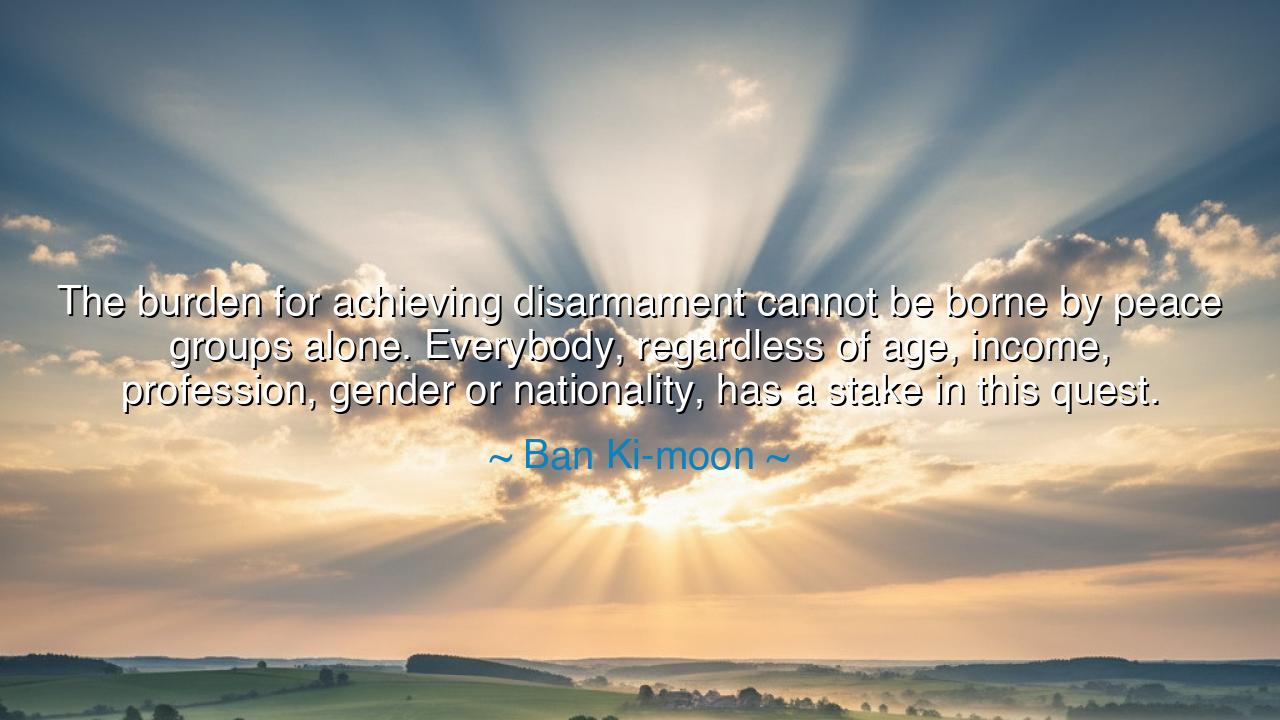
The burden for achieving disarmament cannot be borne by peace
The burden for achieving disarmament cannot be borne by peace groups alone. Everybody, regardless of age, income, profession, gender or nationality, has a stake in this quest.






In the grand theater of existence, where the forces of war and peace constantly clash, there are moments when the voice of wisdom rises above the din of conflict, calling for unity, understanding, and action. The words of Ban Ki-moon, former Secretary-General of the United Nations, resonate deeply in this regard: "The burden for achieving disarmament cannot be borne by peace groups alone. Everybody, regardless of age, income, profession, gender, or nationality, has a stake in this quest." This is not merely a call to action; it is a clarion summons to all of humanity to recognize that the pursuit of peace, of disarmament, is not the work of a select few, but the shared responsibility of all people, across all walks of life.
What does it mean that the burden of disarmament should not rest solely with peace groups? To seek peace is to recognize that the threat of violence and destruction affects every person, regardless of their station in life. The great battle for disarmament is not fought solely by those who advocate for peace or those who have already suffered the horrors of war, but by all those who understand the interconnectedness of humanity. Just as the tree’s roots are entwined in the soil, so too are the fates of individuals across the world intertwined by the destructive power of weapons. To ignore the role of the individual in this quest is to weaken the very foundation upon which true peace can be built.
In the ancient world, there were wars that spread across vast lands, changing the course of civilizations. Yet, there were also moments of unity, when kingdoms, once locked in battle, came together to sign treaties of peace. Consider the example of the Treaty of Westphalia, which ended the Thirty Years' War in Europe. This treaty, signed in 1648, brought peace to a continent ravaged by conflict, and it was not achieved by the efforts of one group alone. It was the collective will of nations, of diplomats, of people from all walks of life, that forged the path toward reconciliation. The idea that peace could be achieved through the actions of only one group or nation would have been unthinkable. This collective effort is echoed in Ban Ki-moon’s words, which remind us that the quest for disarmament is one that requires the effort of every person, not just those who march for peace.
The importance of disarmament and the role that every individual plays in it is clear in the story of Mahatma Gandhi. Gandhi, though a man of peace, understood that disarmament was not just about the end of weapons but the transformation of the heart. He called upon the people of India, from the highest rulers to the humblest farmers, to take part in the nonviolent resistance against British rule. It was not just a movement led by a few leaders, but a collective effort that united people of all ages, backgrounds, and professions. Gandhi’s insight was that true peace could only be achieved if every individual took responsibility for it, not just by ceasing violence, but by changing the very attitudes that fueled conflict.
Yet, disarmament is not only a matter of the body—it is a matter of the soul. In every conflict, in every war, there are human costs that extend far beyond the battlefield. The violence that ravages nations, the destruction that lays waste to communities, touches the hearts of individuals, causing suffering that is passed down through generations. It is not enough for only activists and leaders to bear the weight of these burdens. As Ban Ki-moon notes, each person—regardless of age, profession, or background—must be involved in the quest for peace. Whether through advocating for dialogue, educating future generations, or choosing to live peacefully within one’s own community, we are all part of the solution.
We must, as a global community, recognize the moral responsibility that comes with the very existence of destructive weapons. To build a peaceful future, we must start by questioning the values that perpetuate war. How do we view conflict? How do we view violence? These questions demand answers from every one of us. The pursuit of disarmament is not a distant task for governments alone, but a daily challenge for individuals, in homes, classrooms, and workplaces. Every act of kindness, every choice to resolve conflicts peacefully, every effort to raise awareness of the destructive power of weapons is a step toward a world free from the threat of war.
Therefore, the lesson Ban Ki-moon imparts to us is one of shared responsibility. The quest for disarmament cannot be relegated to the few; it must involve the many, for it is in the collective effort of humanity that true peace is realized. We are all part of the web that connects us to one another, and it is through our individual and collective actions that the world will move closer to a state of harmony. Let us not wait for others to lead us in the fight for peace, but let us all, regardless of our station in life, step forward and take our place in this noble pursuit. Only when we all contribute can we build the foundation for a world where the burden of war is replaced by the enduring strength of peace.






AAdministratorAdministrator
Welcome, honored guests. Please leave a comment, we will respond soon